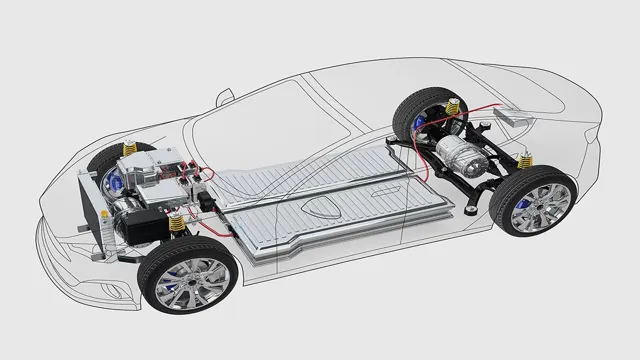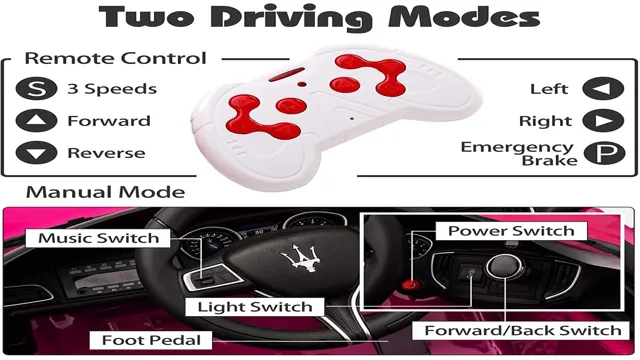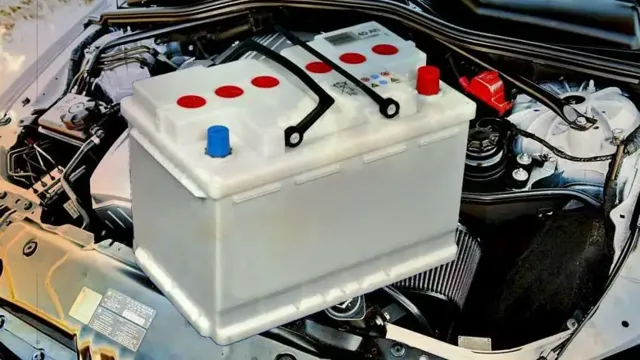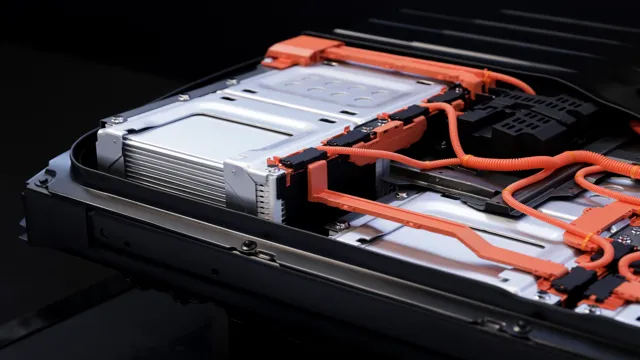Revolutionizing Electric Cars with Advanced Battery Management System: Ensuring Smooth and Sustainable Performance
As the demand for electric vehicles continues to rise, the need for efficient and effective battery management systems becomes paramount. A battery management system (BMS) is a crucial component that monitors and controls the performance of the battery in an electric vehicle. It ensures that the battery is charged and discharged appropriately, and that its operating conditions remain optimal.
Without a properly functioning BMS, electric cars would not be able to deliver the range, reliability and performance that consumers expect. In this blog post, we will explore the importance of battery management systems for electric cars, and how they work to keep your EV running smoothly. So, buckle up and let’s dive in!
What is a Battery Management System?
A battery management system (BMS) is a crucial component of electric cars that helps to control the charging and discharging of the vehicle’s battery pack. It ensures that the battery is charged and discharged within safe limits in order to prolong its lifespan and maintain its optimal performance. The BMS also monitors the temperature and voltage of each individual battery cell to prevent overcharging or overheating, which can be dangerous.
Some BMS systems even incorporate features like regenerative braking and battery preconditioning to further improve the efficiency and range of electric cars. In essence, the battery management system is the brain of an electric car, constantly managing and optimizing the performance of the battery pack to provide the best driving experience possible.
Definition and Function
A Battery Management System (BMS) is an electronic system that monitors and manages the performance of rechargeable batteries. The main function of a BMS is to ensure the safe and efficient operation of the battery pack. It does this by regulating the charging and discharging of the batteries, balancing the voltage levels of each battery cell, and preventing overcharging or overheating.
The BMS also provides important information about the battery’s health, such as remaining capacity, state of charge, and temperature. This information is crucial for extending the life of the battery and avoiding potential safety hazards. Overall, a BMS plays a critical role in the functioning and safety of rechargeable battery systems.

How It Works in Electric Cars
When it comes to electric cars, a crucial component in their power system is the Battery Management System (BMS). The BMS manages the lithium-ion batteries that power electric vehicles. It constantly tracks the battery’s charge level, temperature, and overall health to ensure that the battery can operate optimally.
Additionally, the BMS provides critical information to the car’s other systems, like the motor, to control power distribution and safety functions. Imagine the BMS as the conductor of an orchestra, meticulously monitoring the performance of each individual musician to ensure a harmonious final performance. Just as the conductor makes adjustments to the tempo or volume to create a cohesive sound, the BMS adjusts power distribution to prevent any damage to the battery or unsafe driving conditions.
Overall, the Battery Management System is an essential part of the electric car’s operation, ensuring that the battery remains healthy and safe while providing power to the vehicle.
Why is a Battery Management System so Important?
When it comes to powering an electric car, the battery is the heart of the vehicle. Without it, the car doesn’t move an inch. However, just like any other type of battery, the electric car battery needs to be managed properly to ensure optimal performance and longevity.
This is where a battery management system (BMS) comes into play. The BMS is responsible for monitoring and controlling various aspects of the battery, such as temperature, voltage, and current. It also provides important information to the driver, such as remaining range and charging status.
Without a BMS, the battery could overheat, experience premature degradation, or even catch fire. In short, a BMS is a critical component of any electric car, ensuring that the battery operates safely and efficiently. So if you’re considering buying an electric car, be sure to choose one with a reliable and robust battery management system.
Safety and Efficiency Benefits
Battery Management System When it comes to the safety and efficiency of battery-powered devices, a Battery Management System (BMS) is an absolute necessity. Without a BMS in place, batteries can overheat, overcharge, or even catch fire – posing a significant safety risk to users. A BMS regulates the charging and discharging of batteries to ensure optimal performance and prevent hazardous incidents.
Additionally, a BMS helps extend the lifespan of batteries by preventing damage from overcharging, deep discharging, or short-circuiting. This not only saves costs on replacement batteries but also reduces waste. Overall, a BMS is critical in keeping battery-operated devices running safely and efficiently.
Extended Battery Life
Extended Battery Life Are you tired of constantly having to charge your phone or laptop? Do you wish your battery lasted longer? Well, a Battery Management System (BMS) might be the solution you’ve been seeking. A BMS is a crucial component in extending battery life. It monitors the battery’s performance and controls various factors such as temperature, voltage, and current.
By doing so, it ensures the battery operates within a safe and optimal range, thus reducing the likelihood of premature battery failure and enhancing its life expectancy. Without a BMS, the battery’s performance would be unregulated and could potentially overcharge or overheat, thereby causing significant damage and reducing its lifespan. So, whether you’re a gadget enthusiast or a casual user, consider investing in a BMS to keep your devices running longer and more efficiently.
Key Features of Battery Management Systems for Electric Cars
If you’re a Tesla enthusiast or own an electric car yourself, you may be familiar with the term “battery management system” or BMS. The BMS is the brain of the battery pack in an electric car, and its primary function is to ensure that the battery cells stay healthy and operate within safe limits. Some key features of a BMS include cell balancing, temperature monitoring, state-of-charge estimation, and over/under-voltage protection.
Cell balancing is particularly important because it ensures that all cells in the battery pack are charged and discharged equally, extending the life of the battery and preventing premature failure. Temperature monitoring is important to prevent overheating and cell damage, while over/under-voltage protection is critical to prevent catastrophic battery failures. Overall, the BMS is a critical component of any electric car, ensuring that the battery pack operates safely and efficiently, ultimately providing longer life and range for the vehicle.
Monitoring and Balancing Cell Voltage
Electric car manufacturers have to ensure that the battery management system (BMS) in their vehicles can monitor and balance cell voltage. This is a crucial feature as it can prevent individual cells from overcharging or undercharging, which can lead to a shorter battery lifespan or even safety hazards. BMSs achieve this by constantly monitoring the voltage of each cell and adjusting the charging or discharging rate as necessary to keep all cells within a safe operating range.
In addition to this, BMSs can also provide diagnostic information about the battery’s health and performance, allowing for proactive maintenance and replacement of faulty cells before they affect the overall efficiency of the battery. Overall, a robust BMS is essential for electric cars to ensure efficient and safe battery operation, prolong battery life, and deliver a better driving experience to their users.
Temperature Regulation
Temperature Regulation When it comes to electric cars, the battery management system (BMS) plays a crucial role in ensuring optimal performance of the battery. One key feature of BMS is temperature regulation. Lithium-ion batteries, which are commonly used in electric cars, are sensitive to temperature changes and can experience performance degradation, shortened lifespan, and even safety issues if not kept within a specific temperature range.
BMS helps regulate the temperature of the battery by monitoring internal and external temperatures and adjusting cooling or heating systems accordingly. This ensures that the battery stays within a safe temperature range, thereby improving its performance and minimizing the risk of any safety concerns. In short, temperature regulation is one of the key features of BMS that makes electric cars more reliable, efficient, and safe to drive.
Future Developments in Battery Management Systems
As the demand for electric vehicles increases, the development of battery management systems (BMS) is also gaining traction. BMS plays a crucial role in maintaining the health and efficiency of the electric car battery pack. In the future, we can expect more advanced BMS with features such as predictive maintenance and real-time monitoring.
Predictive maintenance utilizes data and algorithms to detect potential issues before they occur, allowing for proactive maintenance and preventing costly repairs. Real-time monitoring allows for the BMS to quickly respond to any changes in the battery pack, ensuring that the battery is always functioning optimally. Additionally, the future of BMS will focus on improving the overall performance of the electric car battery.
With advancements in battery chemistry and materials, BMS will need to be adapted to maximize the potential of these new technologies. Overall, the future of BMS in electric cars is exciting, and we can expect significant advancements that will improve the reliability, efficiency, and performance of our electric vehicles.
Improved Efficiency and Range
Battery management systems (BMS) are becoming increasingly vital in improving the efficiency and range of batteries used in electric vehicles. They monitor the battery’s performance, including its state of charge, temperature, and voltage, to optimize its functionality and extend its lifespan. In the future, advancements in BMS technology will facilitate the seamless integration of batteries into power grids, enabling electric vehicles to function as mobile energy storage systems.
This will further reduce carbon emissions and costs associated with energy generation. With the growing demand for cleaner and more sustainable means of transportation, improved BMS technology will play a critical role in realizing this vision. As such, it is crucial for manufacturers to invest in the development of more advanced and sophisticated battery management systems.
Integration with Charging Infrastructure
As electric vehicles become more commonplace and charging infrastructure continues to expand, battery management systems (BMS) are poised for even more significant advancements. Currently, BMS allows for the monitoring and maintenance of a battery’s health and performance. In the future, there will be more integration with charging infrastructure that will allow for predictive charging and energy management.
For example, BMS could consider the state of each charging station and the available grid energy and allocate charging accordingly. This type of system could help alleviate strain on the grid during peak hours and ensure a more efficient charging process for electric vehicle owners. As these developments continue, we can expect even greater reliability and convenience in our electric vehicle usage.
Conclusion
In conclusion, a battery management system is like the brain of an electric car. It keeps the battery healthy, maximizes its lifespan, and ensures we don’t end up stranded on the side of the road. Without it, an electric car would be like a marathon runner without their coach – capable but prone to burning out.
So make sure to thank your battery management system for all the hard work it does, and don’t forget to give it a little extra love when you plug in for the night!”
FAQs
What is a battery management system in an electric car?
A battery management system in an electric car is a system that manages the charging and discharging of the batteries in order to maximize their lifespan and ensure that the car has enough power to run.
How does a battery management system work in an electric car?
A battery management system in an electric car works by monitoring the battery’s state of charge, temperature, and voltage to determine how much power it can safely deliver. It also manages the charging and discharging of the battery to keep it within safe limits.
What are the benefits of a battery management system in an electric car?
The benefits of a battery management system in an electric car include increased battery lifespan, improved safety, and more efficient use of the battery’s energy.
Can a battery management system be retrofitted to an existing electric car?
Yes, a battery management system can be retrofitted to an existing electric car, but it may require modifications to the car’s electrical system and is typically best done by a professional.






